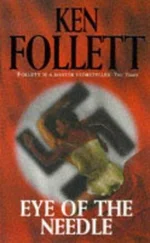Ken Follett - The Key to Rebecca
Здесь есть возможность читать онлайн «Ken Follett - The Key to Rebecca» весь текст электронной книги совершенно бесплатно (целиком полную версию без сокращений). В некоторых случаях можно слушать аудио, скачать через торрент в формате fb2 и присутствует краткое содержание. Жанр: Шпионский детектив, на английском языке. Описание произведения, (предисловие) а так же отзывы посетителей доступны на портале библиотеки ЛибКат.
- Название:The Key to Rebecca
- Автор:
- Жанр:
- Год:неизвестен
- ISBN:нет данных
- Рейтинг книги:4 / 5. Голосов: 1
-
Избранное:Добавить в избранное
- Отзывы:
-
Ваша оценка:
- 80
- 1
- 2
- 3
- 4
- 5
The Key to Rebecca: краткое содержание, описание и аннотация
Предлагаем к чтению аннотацию, описание, краткое содержание или предисловие (зависит от того, что написал сам автор книги «The Key to Rebecca»). Если вы не нашли необходимую информацию о книге — напишите в комментариях, мы постараемся отыскать её.
The Key to Rebecca — читать онлайн бесплатно полную книгу (весь текст) целиком
Ниже представлен текст книги, разбитый по страницам. Система сохранения места последней прочитанной страницы, позволяет с удобством читать онлайн бесплатно книгу «The Key to Rebecca», без необходимости каждый раз заново искать на чём Вы остановились. Поставьте закладку, и сможете в любой момент перейти на страницу, на которой закончили чтение.
Интервал:
Закладка:
Vandam’s wartime career had so far been distinguished by one spectacular success and one great failure. The failure took place in Turkey. Rashid Ali had escaped there from Iraq. The Germans wanted to get him out and use him for propaganda; the British wanted him kept out of the limelight; and the Turks, jealous of their neutrality, wanted to offend nobody. Vandam’s job had been to make sure Ali stayed in Istanbul, but Ali had switched clothes with a German agent and slipped out of the country under Vandam’s nose. A few days later he was making propaganda speeches to the Middle East on Nazi radio. Vandam had somewhat redeemed himself in Cairo. London had told him they had reason to believe there was a major security leak there, and after three months of painstaking investigation Vandam had discovered that a senior American diplomat was reporting to Washington in an insecure code. The code had been changed, the leak had been stopped up and Vandam had been promoted to major.
Had he been a civilian, or even a peacetime soldier, he would have been proud of his triumph and reconciled to his defeat, and he would have said: “You win some, you lose some.” But in war an officer’s mistakes killed people. In the aftermath of the Rashid Ali affair an agent had been murdered, a woman, and Vandam was not able to forgive himself for that.
He knocked on Lieutenant Colonel Bogge’s door and walked in. Reggie Bogge was a short, square man in his fifties, with an immaculate uniform and brilliantined black hair. He had a nervous, throat-clearing cough which he used when he did not know quite what to say, which was often. He sat behind a huge curved desk—bigger than the DMI’s—going through his in tray. Always willing to talk rather than work, he motioned Vandam to a chair. He picked up a bright-red cricket ball and began to toss it from hand to hand. “You played a good game yesterday,” he said.
“You didn’t do badly yourself,” Vandam said. It was true: Bogge had been the only decent bowler on the Intelligence team, and his slow googlies had taken four wickets for forty-two runs. “But are we winning the war?”
“More bloody bad news, I’m afraid.” The morning briefing had not yet taken place, but Bogge always heard the news by word of mouth beforehand. “We expected Rommel to attack the Gazala Line head on. Should have known better—fellow never fights fair and square. He went around our southern flank, took the Seventh Armored’s headquarters, and captured General Messervy.”
It was a depressingly familiar story, and Vandam suddenly felt weary. “What a shambles,” he said.
“Fortunately he failed to get through to the coast, so the divisions on the Gazala Line didn’t get isolated. Still ...”
“Still, when are we going to stop him?”
“He won’t get much farther.” It was an idiotic remark: Bogge simply did not want to get involved in criticism of generals. “What have you got there?”
Vandam gave him the incident report. “I propose to follow this one through myself.”
Bogge read the paper and looked up, his face blank. “I don’t see the point.”
“It looks like a blown cover.”
“Uh?”
“There’s no motive for the murder, so we have to speculate,” Vandam explained. “Here’s one possibility: the hitchhiker was not what he said he was, and the corporal discovered that fact, and so the hitchhiker killed the corporal.”
“Not what he said he was—you mean he was a spy?” Bogge laughed. “How d’you suppose he got to Assyut—by parachute? Or did he walk?”
That was the trouble with explaining things to Bogge, thought Vandam: he had to ridicule the idea, as an excuse for not thinking of it himself. “It’s not impossible for a small plane to sneak through. It’s not impossible to cross the desert, either.”
Bogge sailed the report through the air across the vast expanse of his desk. “Not very likely, in my view,” he said. “Don’t waste any time on that one.”
“Very good, sir.” Vandam picked up the report from the floor, suppressing the familiar frustrated anger. Conversations with Bogge always turned into points-scoring contests, and the smart thing to do was not to play. “I’ll ask the police to keep us informed of their progress—copies of memos, and so on, just for the file.”
“Yes.” Bogge never objected to making people send him copies for the file: it enabled him to poke his finger into things without taking any responsibility. “Listen, how about arranging some cricket practice? I noticed they had nets and a catching boat there yesterday. I’d like to lick our team into shape and get some more matches going.”
“Good idea.”
“See if you can organize something, will you?”
“Yes, sir.” Vandam went out.
On the way back to his own office, he wondered what was so wrong with the administration of the British Army that it could promote to lieutenant colonel a man as empty-headed as Reggie Bogge. Vandam’s father, who had been a corporal in the first war, had been fond of saying that British soldiers were “lions led by donkeys.” Sometimes Vandam thought it was still true. But Bogge was not merely dull. Sometimes he made bad decisions because he was not clever enough to make good decisions; but mostly, it seemed to Vandam, Bogge made bad decisions because he was playing some other game, making himself look good or trying to be superior or something, Vandam did not know what.
A woman in a white hospital coat saluted him and he returned the salute absentmindedly. The woman said: “Major Vandam, isn’t it?”
He stopped and looked at her. She had been a spectator at the cricket match, and now he remembered her name. “Dr. Abuthnot,” he said. “Good morning.” She was a tall, cool woman of about his age. He recalled that she was a surgeon—highly unusual for a woman, even in wartime—and that she held the rank of captain.
She said: “You worked hard yesterday.”
Vandam smiled. “And I’m suffering for it today. I enjoyed myself, though.”
“So did I.” She had a low, precise voice and a great deal of confidence. “Shall we see you on Friday?”
“Where?”
“The reception at the Union.”
“Ah.” The Anglo-Egyptian Union, a club for bored Europeans, made occasional attempts to justify its name by holding a reception for Egyptian guests. “I’d like that. What time?”
“Five o’clock, for tea.”
Vandam was professionally interested: it was an occasion at which Egyptians might pick up service gossip, and service gossip sometimes included information useful to the enemy. “I’ll come,” he said.
“Splendid. I’ll see you there.” She turned away.
“I look forward to it,” Vandam said to her back. He watched her walk away, wondering what she wore under the hospital coat. She was trim, elegant and self-possessed: she reminded him of his wife.
He entered his office. He had no intention of organizing a cricket practice, and he had no intention of forgetting about the Assyut murder. Bogge could go to hell. Vandam would go to work.
First he spoke again to Captain Newman, and told him to make sure the description of Alex Wolff got the widest possible circulation.
He called the Egyptian police and confirmed that they would be checking the hotels and flophouses of Cairo today.
He contacted Field Security, a unit of the prewar Canal Defense Force, and asked them to step up their spot checks on identity papers for a few days.
He told the British paymaster general to keep a special watch for forged currency.
He advised the wireless listening service to be alert for a new, local transmitter; and thought briefly how useful it would be if the boffins ever cracked the problem of locating a radio by monitoring its broadcasts.
Читать дальшеИнтервал:
Закладка:
Похожие книги на «The Key to Rebecca»
Представляем Вашему вниманию похожие книги на «The Key to Rebecca» списком для выбора. Мы отобрали схожую по названию и смыслу литературу в надежде предоставить читателям больше вариантов отыскать новые, интересные, ещё непрочитанные произведения.
Обсуждение, отзывы о книге «The Key to Rebecca» и просто собственные мнения читателей. Оставьте ваши комментарии, напишите, что Вы думаете о произведении, его смысле или главных героях. Укажите что конкретно понравилось, а что нет, и почему Вы так считаете.












